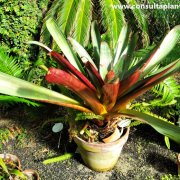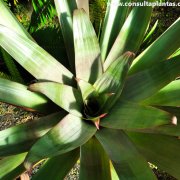Care of the indoor plant Alcantarea imperialis or Imperial Bromeliad |
|
The genus Alcantarea, family Bromeliaceae, includes 19 species of bromeliads native to Brazil. Some species are: Alcantarea imperialis, Alcantarea odorata, Alcantarea extensive, Alcantarea glaziouana, Alcantarea regina. Common names: Giant Vriesea, Imperial Bromeliad, Giant bromeliad. Scientific synonym: Vriesea imperialis. This species is native to the state of Rio de Janeiro, Brazil. They are large, elegant, short-stemmed, slow-growing bromeliads that reach 1.5 meters (5 feet) in height and 2 meters (6.56 feet) in diameter. The leathery leaves are arranged in a rosette, are elongated and bright green or bluish green on the upper side and reddish on the underside. The spectacular pyramidal flower stem reaches 5 meters (16.4 feet) in height. The yellowish tubular flowers have purple, yellow or green bracts. They bloom only once in spring after 6 years of life. After flowering, the mother plant dies but before it produces suckers at the base. Giant Vriesea is used in large pots for patios, terraces and greenhouses. In winter it is advisable to protect them from the cold. In frost-free climates they are used on edges, in flower beds and in light undergrowth. Alcantarea imperialis grows in full sun and light shade exposures. Although the safety temperature is 10 ºC (50 ºF), adult plants can resist light and occasional frosts. The soil can be normal, well-drained garden soil with coarse sand and containing organic matter. The transplant is done in the fall. Regularly water the rosette with water without lime and renew said water periodically to prevent mosquitoes from reproducing in said water. In winter keep the rosette dry. Never flood the substrate. It is important that the environmental humidity is medium-high. Fertilize every 3 months with foliar fertilizer in spring and summer. Prune dry leaves and wilted flower stem. When the mother plant dies, it is cut from the base to favor the growth of the suckers. Imperial Bromeliad is a quite resistant plant to the usual pests and diseases. It can be attacked by aphids, thrips and mealybugs if suffer from drought or the environmental humidity is low. Giant bromeliad is propagated from spring sown seeds and by sucker separation. |
Images of the indoor plant Alcantarea imperialis or Imperial Bromeliad |
Find plants
Alcantarea imperialis or Imperial Bromeliad | Care and Growing
© 2026 FavThemes

